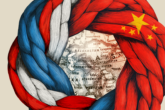April 27, 2022
Sharper: Taiwan
Analysis from CNAS experts on the most critical challenges for U.S. foreign policy.
Taiwan plays a pivotal role in East Asian and global affairs. It has long been a central point of contention in the strategic competition between the United States and China. Effective U.S. policy toward Taiwan can enhance regional security, drive continued economic and technological progress, and support a rules-based international order. And the recent Russian invasion of Ukraine has led to speculation about the fallout of a similar situation in Taiwan. CNAS experts are sharpening the conversation around Taiwan policy. Continue reading this edition of Sharper to explore their ideas and recommendations.
Features
Global Island: Sustaining Taiwan's International Participation Amid Mounting Pressure from China
China under Chinese Communist Party General Secretary Xi Jinping has ramped up political, economic, and military pressure on Taiwan. The roots of Beijing’s pressure campaign, including Xi’s personal interactions with Taiwan policy, go back decades. But recent events have deepened and intensified China’s efforts, which include seeking to block Taiwan from engaging the rest of the world as part of a comprehensive strategy to force Taipei to move toward unification with the mainland on Beijing’s terms. A new report from authors Jacob Stokes, Fellow in the Indo-Pacific Security Program; Alexander Sullivan, Adjunct Fellow in the Indo-Pacific Security Program; and Zachary Durkee, former consultant with the Indo-Pacific Security Program explores trends related to Taiwan’s international participation and offers a framework for how Washington, Taipei, and interested allies and partners can respond to growing pressure from Beijing.
When the Chips Are Down
Essential to the day-to-day functioning of modern society, semiconductors are increasingly at the center of a high-stakes competition between the U.S. and China. Taiwan—already a flashpoint in this competition—accounts for 92 percent of the world’s most advanced chip manufacturing capacity. Control over Taiwanese semiconductor facilities and human capital would give China roughly half of global chip fabrication capacity and almost all state-of-the-art manufacturing capacity. A virtual strategy game conducted by CNAS, and detailed in a report, has produced critical insights into the nature of U.S.-China strategic competition and global competition for semiconductors.
Global Island: Sustaining Taiwan’s International Participation Amid Mounting Pressure from China
China under Chinese Communist Party (CCP) General Secretary Xi Jinping has ramped up political, economic, and military pressure on Taiwan. The roots of Beijing’s pressure camp...
When the Chips Are Down
The United States is in a strategic competition with a well-resourced and capable opponent. China seeks a global role that is broadly at odds with the strategic interests and ...
The Poison Frog Strategy
How could the United States respond if China seized one of Taiwan’s outlying islands in the South China Sea? A recent report from CNAS’ Gaming Lab details the outcomes of the virtual strategy game, which saw the U.S. team relying on military force in ways that were risky and would be difficult to sustain. At the same time, other non-military options, such as economic sanctions or information campaigns, took too long to produce effects and appeared too weak to compel China to abandon its gains.
Noteworthy: Indo-Pacific Strategy of the United States
In February of 2022, the Biden-Harris administration released a strategy for the increasingly important Indo-Pacific region, stating, "The United States has long recognized the Indo-Pacific as vital to our security and prosperity." Experts from the Center for a New American Security weighed in with in-line analysis of the strategy document, including maintaining stability in the Taiwan Strait.
The Poison Frog Strategy
How could Taiwan and the United States respond if China seized one of Taiwan’s outlying islands, such as Pratas/Dongsha (hereafter Dongsha) in the South China Sea? Whereas the...
NOTEWORTHY: Indo-Pacific Strategy of the United States
Experts from the Center for a New American Security weighed in with in-line analysis of the Indo-Pacific Strategy of the United States that was released by the White House in ...
Commentaries
Why China Sees Opportunity in Russia’s Invasion of Ukraine
"In recent weeks, China has touted its strategic partnership with Russia while being circumspect about Moscow’s threats to Ukraine, raising questions about whether the two authoritarian powers will stick together," observes Jacob Stokes in POLITICO. "There’s even been speculation that Russian President Vladimir Putin conferred with Chinese President Xi Jinping before deciding to invade or that China will take notes for a future invasion of Taiwan. The reality is that a Russian invasion of Ukraine was probably not China’s preferred outcome. But now that it’s happened, China will likely find ways to support Russia while leveraging the crisis for its own benefit. The two countries genuinely share a worldview of the West as aggressor and China and Russia as victims. More tangibly, China will also seek to profit from Russia’s economic and political isolation."
Where the U.S. Chips Fall: Fault Lines and Big Breaks in the Global Semiconductor Industry
"Modern life hinges on reliable access to semiconductor chips. Recent shortages have shaken critical supply chains, highlighting how precarious the global semiconductor industry is and how reliant the international community is on chips for their economic and national security," argues Hannah Kelley in The Georgetown Journal of International Affairs. "Taiwan stands at the center of this dynamic. As the third-largest producer of silicon-based hardware and foremost leader in chip fabrication, jeopardizing Taiwan’s production would threaten the stability of the global information technology economy. Taiwan uses its economic indispensability to generate foreign interest in maintaining the status quo with China in the Taiwan Strait, a strategy dubbed its “silicon shield.” How the United States engages with Taiwan and the global semiconductor industry at large—whether prioritizing its own domestic capabilities or seeking increased bilateral and multilateral cooperation—will not only impact global supply chain resiliency but set the tone for future technology competition with China and other illiberal actors."
Mind the Gap: How China's Civilian Shipping Could Enable a Taiwan Invasion
"Despite many worrying aspects of the degrading cross-Taiwan Strait military balance, the Chinese military does not appear to have enough amphibious assault capacity on its own to successfully invade Taiwan, and hasn’t seemed to make it a high priority to get more," writes Thomas Shugart in War on the Rocks. "The U.S. Department of Defense’s assessment of China’s amphibious lift capacity stated that the amphibious fleet seemed to be focused on global expeditionary missions rather than “the large number of landing ship transports and medium landing craft” that would be required for a full-scale beach assault. Taiwan’s own Ministry of Defense has largely concurred, indicating that China 'lacks the landing vehicles and logistics required to launch an incursion into Taiwan.'"
Why China Sees Opportunity in Russia’s Invasion of Ukraine
China will likely continue to walk a fine line to skirt international condemnation, as the readout from Xi’s Friday call with Putin shows....
Where the U.S. Chips Fall: Fault Lines and Big Breaks in the Global Semiconductor Industry
Modern life hinges on reliable access to semiconductor chips...
Mind the Gap: How China's Civilian Shipping Could Enable a Taiwan Invasion
The Chinese military now seems to be regularly practicing the execution of amphibious assaults with civilian shipping integrated into the operations...
In the News
Featuring commentary and analysis by Jacob Stokes, Martijn Rasser, Emily Kilcrease, Chris Dougherty, and Kelley Currie.
What Taiwan can learn from Russia’s invasion of Ukraine
On a Friday night in Taipei, dozens of people gather in a bookstore to learn what to do if war comes to Taiwan. The shop window is plastered with slogans denouncing China and ...
T-DAY: The Battle for Taiwan
On the front line of the superpower struggle between the United States and China, Taiwan has fashioned a defensive masterstroke. It has become indispensable to both sides. In ...
How Sanctions on Russia, War in Ukraine and Covid in China Are Transforming Global Supply Chains
A new world order is emerging for the vital supply chains that deliver most of the goods we rely on for our daily existence. Companies, especially tech companies, are question...
Imagining the Unimaginable: The U.S., China and War Over Taiwan
A war over Taiwan would likely involve the largest and most complex amphibious invasion ever mounted. Were the conflict to drag on, it might well evolve into a building-to-bui...
Biden delegation backs Taiwan amid China threat, Ukraine war
Former top defense and security officials sent by U.S. President Joe Biden arrived in Taipei late Tuesday to shore up Taiwan's international support in the face of threats fro...
5 things to know about China's record surge of warplanes near Taiwan
At no time during the surge of Chinese flights has it been suggested that actual combat was imminent, but the Western analysts say China is able to make several points without...
About the Sharper Series
The CNAS Sharper series features curated analysis and commentary from CNAS experts on the most critical challenges in U.S. foreign policy. From the future of America's relationship with China to the state of U.S. sanctions policy and more, each collection draws on the reports, interviews, and other commentaries produced by experts across the Center to explore how America can strengthen its competitive edge.
Subscribe
Sign up to receive the latest analysis from the CNAS expert community on the most important issues facing America's national security.
Thank you for registering! You will receive a confirmation email shortly. All CNAS events are free, open to the public, and viewable from cnas.org/live.
Stay up-to-date with report releases, events, major updates, and announcements from the Center for a New American Security.
More from CNAS
-
Trump 2.0 and Security in Asia
Donald Trump is bringing his "America First" agenda back to U.S. foreign policy. What could this mean for Japan and the partners in Asia? Akira Igata, an Adjunct Senior Fellow...
By Akira Igata
-
Syria: What Happened and What Comes Next
After more than a decade of civil war involving major interventions from foreign powers, over the past week a rebel alliance incredibly rapidly gained control of city after ci...
By Richard Fontaine
-
The Future of Russia and China in Central Asia
Despite the many proclamations that Russian and Chinese interests would collide in Central Asia, Moscow and Beijing continue to work together in service of their shared object...
By Andrea Kendall-Taylor & Jim Townsend
-
Russia and China in Central Asia
Executive Summary Despite the many proclamations that Russian and Chinese interests would collide in Central Asia, Moscow and Beijing continue to work together in service of t...
By Andrea Kendall-Taylor, Lisa Curtis, Kate Johnston & Nathaniel Schochet
















